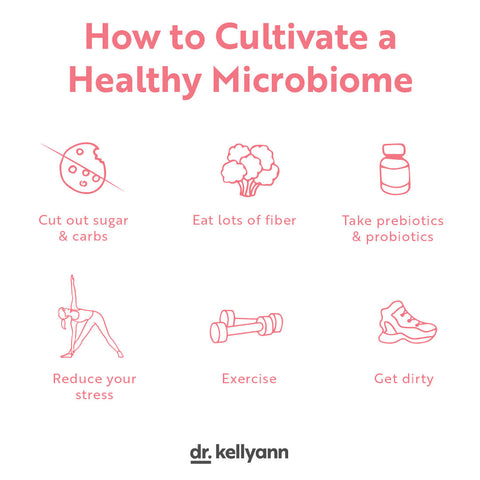
Protect Your Microbiome, so It Can Protect YOU!
Did you know that there’s an entire universe inside you? Well, it’s true!
I’m talking about your gut microbiome—the universe of microbes that live in your intestinal tract. Researchers are discovering that these microbes play a huge role in keeping you healthy. And here’s something really exciting: We now know that you can actually cultivate a healthy microbiome.
Today, I want to dive into what your microbiome is and what it does for you. After that, I’ll talk about how to avoid the biggest microbiome wreckers and keep your gut microbiome happy and healthy.
What is your microbiome?
Your microbiome consists of trillions of microbes. These microbes include bacteria, fungi, and viruses.
These tiny but tireless workers do lots of jobs, affecting every cell in your body in one way or another.
What does a microbiome do?
- They help you metabolize nutrients.
- They synthesize the B vitamins and vitamin K.
- They help to protect you against dangerous bacteria that invade their turf.
- They help to teach your immune system when to stand down. This is crucial, because an over-active immune system can cause over-active immune system can cause health issues.
- They help to keep you happy. Did you know that 95% of the “brain” chemical serotonin, which plays a big role in your mood, is actually produced by your gut bacteria?
- They affect your levels of “good” cholesterol.
- They play a powerful role in controlling your weight. In one amazing experiment, researchers studied twin pairs consisting of one lean and one obese twin. They transferred gut bacteria from these twins into mice, and guess what: The mice that received bacteria from fat twins got fat, while the mice that got bacteria from lean twins stayed lean.
Clearly, keeping your microbiome in top shape is crucial if you want to be slim, happy, and healthy. Unfortunately, a whole host of things can disrupt the microbial universe inside you—and when it’s in bad shape, so are you.
How can your microbiome be harmed?
The modern world is hard on your gut microbiome, constantly attacking it in one way or another. The worst culprits are antibiotics, which kill off millions of good microbes along with the bad ones. But even if you use antibiotics only when it’s absolutely necessary—which is a very smart idea, by the way—a wide range of environmental insults can damage your microbiome. Here are some of the most common ones:
- Other medications. One quarter of the drugs that affect human cells affect our gut microbes, too. Proton pump inhibitors, for example, decrease the diversity of your gut microbiome (that’s bad, because a diverse microbiome is a healthier microbiome) and increase the numbers of harmful bacteria in it.
- Stress. When you stress out, your gut bugs stress out right along with you—and over time, stress can make your microbiome unstable.
- A high-sugar, high-carb diet. Sugar stops the production of proteins that foster the growth of beneficial gut microbes. (And remember that carbs—even the so-called “healthy” ones—turn right into sugar in your body.)
- Artificial sweeteners. These may seem like a good alternative to sugar, but they’re actually just as bad because they’re toxic to your gut microbes.
When your gut microbes take too many hits, bad things happen. The good microbes die off, while the bad microbes start taking over. Or the good microbes over-multiply, causing a crisis of overpopulation.
This makes it impossible for your gut microbes to do all of their critical jobs in the right way. So you’re not digesting your food properly. You’re bloated or constipated. Your immune system isn’t working right. Your brain isn’t happy. You fall prey to infections. You even gain weight.
On top of this, your microbiome gets inflamed. This inflammation damages the lining of your intestines, causing holes to open up—what we call a “leaky gut.” When this happens, toxins and undigested food particles escape from your intestinal tract. Your immune system targets these as invaders and unleashes a chemical attack, leading to chronic, body-wide inflammation. This inflammation, in turn, further damages the gut microbiome, in a vicious cycle. It’s a prescription for weight gain, fatigue, and illness.
How can you cultivate a healthy microbiome?
I’ve told you the bad news—but don’t panic, because there’s plenty of good news, too! That’s because we’re discovering that we can cultivate a hardy microbiome that’s strong enough to withstand the daily hits it takes. So no matter what the world dishes out, your microbes can keep doing their jobs.
What’s more, it’s easier than you’d think to nurture your microbiome. Here are my eight simple and powerful tips for tending your internal garden.
- Cut the sugar and carbs. Instead, eat lots of clean protein, healthy fats, veggies, and fruits. These foods give your gut bugs the nutrients they need to thrive.
- Eat lots of fiber. Your gut microbes love fiber, and they’ll reward you for eating it. Research shows that adding fiber to your diet can shift your microbiome from a profile linked to obesity to one linked to slimness, meaning that weight loss becomes easier—and who doesn’t want that?
- Eat probiotics. Probiotics seed your microbiome with beneficial bacteria. You can take probiotics in supplement form, but it’s even better to get them from fermented foods like kimchi, sauerkraut, and pickles. (My favorite is homemade kimchi, which can contain hundreds of different probiotic strains in a single batch, compared to just five or ten in a supplement.) When you buy kimchi, sauerkraut, or pickles, make sure these are refrigerated versions that contain live cultures.
- Eat prebiotics. If probiotics are the seeds in your microbiome garden, prebiotics— special plant fibers that help your gut bugs flourish—are the fertilizer. Some of the best are Jerusalem artichokes, asparagus, bananas, chicory, garlic, onions, and leeks.
- Reduce your stress. Less stress equals a happier microbiome. So every day, schedule at least a few minutes for a stress-busting activity, whether it’s meditating, journaling, doing yoga, or dancing along to your favorite music.
- Exercise. Work out at least three or four times a week. Exercise can increase your population of microbes involved in producing short-chain fatty acids that help to reduce inflammation.
- Get dirty. Yes, there is such a thing as being too clean. You’ll pick up beneficial microbes—and increase the diversity of your microbiome as well—when you dig in the garden, take a hike, or play in the mud. So get down and dirty once in a while. Your gut microbes will thank you for it.
- Take action after a course of antibiotics. As I said earlier, antibiotics are the #1 gut microbiome destroyer. So if you do wind up needing a course of antibiotics, double down on all seven of the previous rules—and, in particular, absolutely load your body with high-quality probiotics (especially kimchi) and prebiotics. It can take up to a year to fully restore your microbiome after a course of antibiotics, so be diligent.

Your gut microbiome needs careful tending, especially in today’s challenging world. Luckily, with enough TLC, you can keep that little universe inside you going strong. When you do, it’ll reward you by banishing your bloat, helping you lose weight more easily, and keeping you healthy and happy.
To get you started, here’s my recipe for home-made kimchi—I hope you AND your gut bugs enjoy it!
Keep Positive and Stay Healthy!








